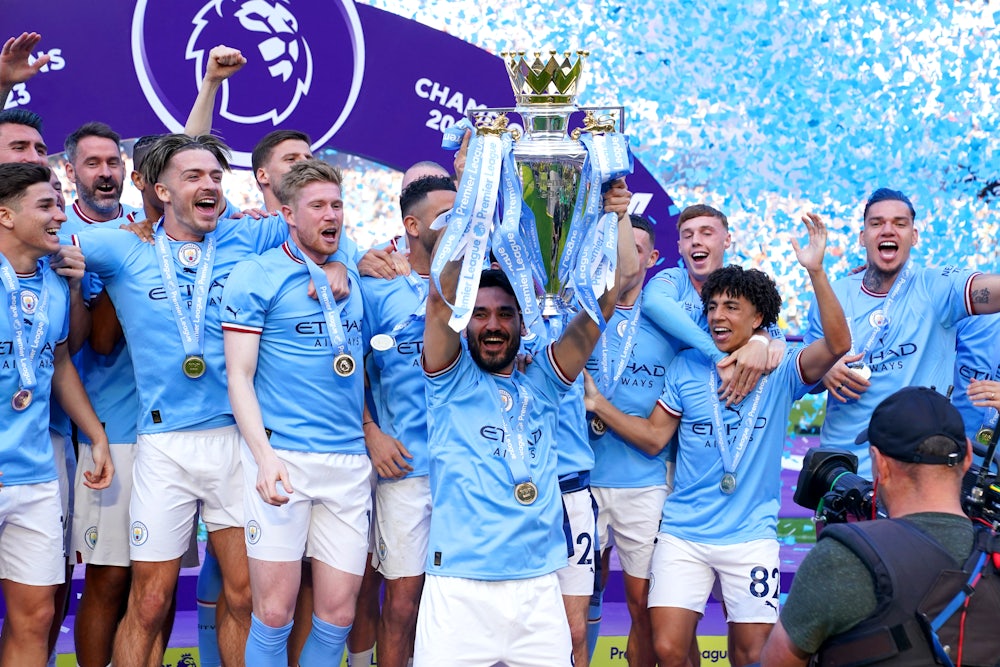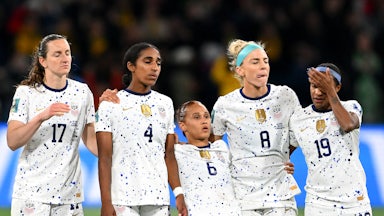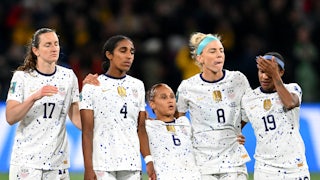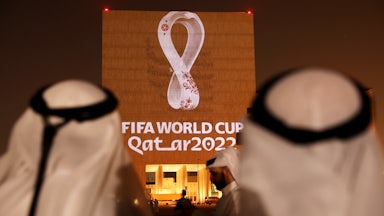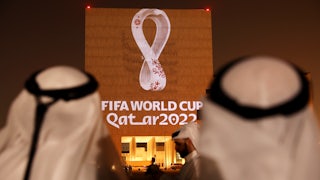The English Premier League’s best meme is a fake quote. “One regular day of Barclays,” a dejected Antonio Conte says in a post-game press conference in 2016, following a match in which Conte’s Chelsea had handed Hull City a 2–0 loss. “That’s all I ask for. Will never happen.” The still image itself is ironic: Conte’s Chelsea had just played a very regular game of soccer. Years later, as Conte switched managerial duties from West London to North London’s Tottenham Hotspur, his life would get more tempestuous, and those “days of Barclays” more irregular.
Regular days of Barclays happen all the time, as any long-suffering, early-rising American fan who has sat through a 1–0 Manchester City–Fulham 7 a.m. game can tell you. In any case, Conte’s actual interview followed a script familiar to anyone who has watched a post-game press conference: The team played well, the win was important, one player (in this case, Victor Moses) was particularly crucial. There is weariness but none of it is existential: Conte is still figuring things out and he necessarily wants to be reliving it in front of reporters. (It’s never quite clear whether he ever truly wants to be anywhere.) Things worked out well for Conte’s Chelsea in the end: They would go on to easily win the league that year.
Still, it’s a good meme because it speaks to the Premier League’s longstanding self-image: Crazy things happen every weekend. Anything could happen. Months before Conte’s image was so immortalized, Leicester City had completed a meteoric rise from England’s third division to win the title. Other football leagues were predictable and top-heavy. But the Premier League was different. This was, after all, where the world’s finest footballers had to face those legendary “rainy nights in Stoke.” (Typically leveled at foreign players, this hoary cliche suggests that there is something innate in England’s geography that makes it different. Oh, and speaking of the Premier League’s “anything can happen” ethos: Leicester City became only the second EPL champion to be relegated at the end of last season.)
As the 2023–24 Premier League season begins, things are far from regular. As I write, Liverpool and Chelsea are battling over who can pay a record transfer fee (more than $100 million) for a 21-year-old midfielder who has played less than 50 top-flight games. Harry Kane, England’s talisman, is set to leave Tottenham—where he has scored more than 200 league goals—for Bayern Munich. Or maybe he won’t! (It seems like he just did but, given this crazy, protracted saga, who knows?) The growing presence of Saudi Arabia in global soccer has brought in an influx of cash, but also concerns about where that money came from and what it will ultimately do. (The answer to the latter question likely being “to buy influence abroad and stability at home.”) Of the reputable Premier League predictions I’ve read in the last week, eight different teams have finished in the top four. We won’t get a “regular day of Barclays” any time soon!
Or will we? For all the chaos, the league still boasts a certain level of consistency. Manchester City, thanks in part to the genius of its manager Pep Guardiola and the largesse of its owners—the United Arab Emirates (literally)—have won the league in five of the last six seasons. Only a handful of prognosticators have dared to say they won’t do it again this year: They have the league’s (and perhaps the world’s) best goalscorer, its best midfielder (though he’s aging), and arguably its best defense, along with its best manager and seemingly unlimited resources.
It seems much more likely that it will be the more than 100 breaches of the league’s financial regulations that prove to be City’s undoing than it will be Arsenal, the team that nearly snatched the title from them last year. (And the most cynical of observers reckon that the league is likely to find a way to look the other way on City’s vast financial doping operation.) Indeed, if you look at an expected points table from last season, a clear picture emerges: Manchester City at the top and then, 10 points behind them, dwell a cluster of very good but not-quite-good-enough teams. (City sits at the top with 83 expected points. Arsenal leads the trailers with 72, followed by, in order, Newcastle, Brighton, Liverpool, and, finally, lowly Manchester United, sitting in sixth with 66 points.)
Naturally, real goals, not expected ones, win matches, and crazy things happen all the time in sports. Would we think of last season differently had Arsenal not stumbled at the end, thanks to an inopportune mix of injuries, mean-reversion, and Rob Holding? Maybe. There is, after all, a considerable difference between three different teams winning the league in four years—Arsenal, Manchester City, Liverpool—than one (Manchester City) winning it five times in six. And yet, the basic fact of Manchester City’s dominance remains in either picture. There is no reason to believe it will be any different this year.
There will be chaos on a week-to-week and game-to-game basis. But much of that chaos now comes off the field. So much of sports media are now dominated by what are, in effect, discussions of money. Soccer is at least largely immune—thanks to its own economic structures—from the dismal practice of referring to players as “assets.” But the players are still bought and sold, and the transfer market goings-on dominate the discussion even after it closes. Fans are encouraged to think like front-office bosses, and the media is only too happy to provide a steady diet of fodder for discussion. Soccer, unlike nearly every other professional sport, has no meaningful limits on spending. It is, at its heart, as much an economic competition as an athletic one; its top flight is, in many ways, a reasonable metaphor for the untrammeled economic competition that has defined the last several decades.
It’s hardly a novel concept for professional sports to be dominated by discussions of the plutocrats involved. But the story of the Premier League is arguably the emblematic example of money in sports. It starts with no less a figure than Rupert Murdoch helping the kick off the boom time, wends its way through the advent of some spectacularly lucrative television deals and sponsorships (can’t have a “day of Barclays” without Barclays, after all), and it rapidly expands to include Russian oligarchs, American hedge funds, and, eventually, whole petrostates.
It’s easy to see the United Arab Emirates’s purchase of Manchester City in 2008 as a watershed moment in the sport—and it was!—but at that point, the EPL’s bottomless greed was already apparent. When fans took to the streets to protest the so-called Super League—a closed international league comprising of most of the sport’s top teams that would have fundamentally altered the sport’s promotion/relegation system—some carried banners reading “Football: Created by the Poor, Stolen by the Rich.” But by the time the fans had hoisted their flags, the sport had already been stolen. Now its brahmins were merely gathered in smoke-filled rooms to find a way to juice a little more money out of it.
But the spiking of the Super League was a short-lived victory for the little guy. Saudi Arabia’s entry into the Premier League—it bought Newcastle United in 2021—represents a disgraceful new low. Saudi Arabia has made a rapid and seismic entry into global soccer. Now funding four domestic teams from its Public Investment Fund—the one that technically “owns” Newcastle—it has hoovered up an array of footballing stars. And while the lion’s share is definitely past its prime, it nevertheless comprise many of the sport’s biggest names: Cristiano Ronaldo, N’Golo Kanté, Sadio Mané. The Saudis may be making it up as they go along, but the money speaks loudly. (Even when the money isn’t sufficient, it’s still good marketing: Offers of nearly $1 billion each for the sport’s best two players, Kylian Mbappé and Lionel Messi may have gone unclaimed, but the Kingdom at least got to show the world how much money they had to spend on the game—a lot.)
The most apocalyptic predictions about Saudi Arabia’s entry into soccer have not come to pass and still look reasonably far off. The idea of the country “buying” the sport in the way that it recently bought golf has always been far-fetched. There is a general sense that most major players in the sport think that its entry into global soccer will be like China’s: There will be a flurry of spending before ultimately the whole project is deemed to be a waste of money.
The idea that the Saudi Premier League will imminently take hold as a major player on global soccer’s grand stage seems similarly far-fetched. However, the idea that Saudi Arabia could use its foothold in the sport to increase its political influence at home and abroad is not. While many, myself very much included, have focused on issues like “sportswashing,” the most instructive article about Saudi Arabia came from The New York Times’s Rory Smith and Tariq Panja: They found that teams and agents were happy to milk as much money as they could from the Saudis and gave scant regard to the potential consequences. A new source of revenue is a new source of revenue—and blood money still fits in a wallet. For teams—and it is very, very hard to run a top-flight soccer team at a profit—and agents (always looking to skim as much as they can) Saudi’s overflowing fountain of boodle is an unmissable opportunity to get a little wet. (As an aside, Smith and Panja both belonged to the Times’s now-shuttered Sports section and both make a strong case for the irreplaceable value of general interest sports coverage.)
Saudi Arabia has not gotten into international soccer for the same reasons as China. China wanted to grow its domestic league in order to foster the quality of its own international team—a move that quickly came to be regarded as a money sink. Saudi Arabia is spending on soccer both to build its global influence and to pacify its population, 70 percent of which is under the age of 35. It is rapidly trying to remake its economy for a post-fossil fuel world and sees sports as a crucial aspect of that project. Saudi Arabia isn’t going to become a dominant force in global soccer overnight, but a death-by-a-thousand-cuts scenario is possible. It’s not just older and past-their-prime players it’s acquiring, after all. Still, the permissiveness that European clubs have shown as far as dealing with deep-pocketed petrostate dictatorships has underscored how craven the sport can be. And, for that matter, how desperate for money the league’s top brass really is.
Soccer and politics—and, for that matter, economics—have always gone together. But it is truly insane how interlinked they have become. Does the fact that Saudi Arabia was bidding for Mbappe—who plays for the Qatari-owned Paris Saint-Germain—signal a thawing of Saudi-Qatari relations? Does a bid for Manchester City’s Riyad Mahrez suggest that the relationship between the Kingdom and the UAE hasn’t frayed as much as it seems? What do we make of an outrageous $60 million price paid for Brazilian footballer Malcolm of Zenit St. Petersburg, which is owned by Gazprom? Should this be considered a form of aid to Russia? These are questions that now inevitably come with following soccer.
But all of that is, blessedly, off the field. On the pitch, the sport continues to remind us of how magical it can be to watch the joyous chaos of soccer. Sure, the league title already feels sewn up at the start of the season—how could anyone not pick Manchester City to win? But there will be tumult galore: The Premier League is more top-heavy than ever. Its worst teams are quite bad (sorry to newly promoted Luton Town). But there’s still spicy competition and performances from the world’s best stars to enjoy.
Manchester City and Arsenal will, or at least should, be very good. But there are some big questions about the rest of the league. Liverpool remain very good on paper but have not fixed their biggest problem from last season (that problem being that they allow teams to take too many really good shots) and will most likely, thanks in part to Saudi Arabia, begin a season without a defensive midfielder, the sport’s most important position. Chelsea may have gotten better but are still addicted to pandemonium. Tottenham just lost their talisman but a new manager has boosted the hope of a return to the kind of form that took them to the 2019 Champions League Final. Upstarts Brighton and Newcastle are unproven, as are Aston Villa, but all three could parlay strong foundations and little luck with a rise up the pecking order. Manchester United are … well, still Manchester United. The only near certainties are that Manchester City will win the league and Luton will go down. (Sorry to keep picking on you, Luton. I love your tiny stadium and will try to catch a game the next time I go to the airport.)
The big story of soccer remains the growing influence of money and the troubling rise of foreign states. Everywhere you can see the potential seeds of the Premier League’s undoing being planted. But there will be some regular days to savor, some of which will be crazy in the best possible way. At any rate, for now, I welcome the return of soccer—if only as a respite from all of the transfer rumors.
